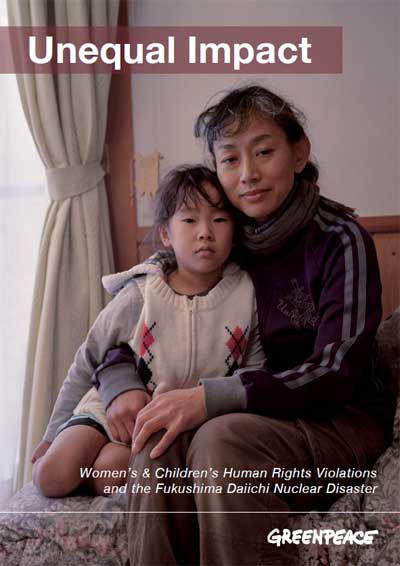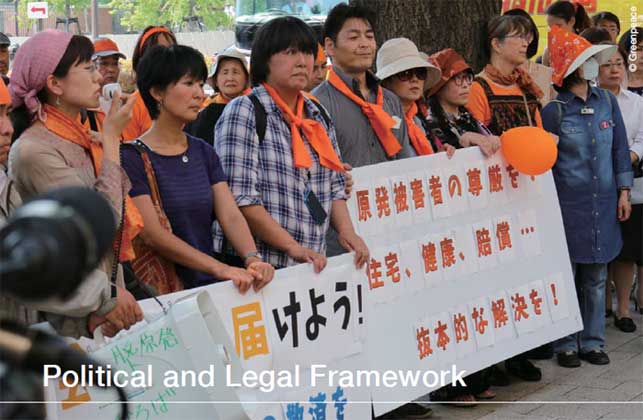Fukushima resettlement policy violates international human rights commitments & Japanese law
Japan’s policy to resettle residents to heavily contaminated areas in Fukushima is in contravention of Japanese law and multiple international human rights treaties. Greenpeace Japan and Human Rights Now detailed today numerous human rights violations resulting from the Japanese government’s response over the past six years to the 2011 Fukushima Daiichi nuclear disaster.
“If there is anything the nuclear industry learned from Chernobyl, it’s that a large exclusion zone is bad for business. It’s a constant reminder that a nuclear disaster is irreversible, and it’s women and children who are bearing the brunt,” said Kendra Ulrich, Senior Global Energy Campaigner with Greenpeace Japan.
“Cutting off housing support for self-evacuees threatens more than 10,000 households, potentially forcing many people back to contaminated areas against their will. Compensation payments will end in a year for people from areas where the evacuation order is being lifted, even though radiation levels far exceed the long-term targets in many areas. This amounts to economic coercion and is a deliberate violation of the law and survivors’ human rights.”
Released a day before International Women’s Day, Greenpeace Japan’s report reveals the greater impact on women and children due to both social disadvantages and increased risks to radiation exposure. [1] Greenpeace Japan, Human Rights Now and Fukushima survivor Noriko Matsumoto are calling on the Abe government to comply with Japanese law and address some of the most serious violations.
A recent Greenpeace Japan led survey team found radiation dose rates at houses in the village of Iitate well above long-term government targets, with annual and lifetime exposure levels posing a long-term risk to citizens who may return. At some homes in Iitate, the dose of radiation is equivalent to one chest X-ray every week. Only 24 percent of the total area of Iitate has been ‘decontaminated’, despite a government website [2] stating that 100% of the decontamination in Iitate is completed.
Evacuation orders will be lifted in many areas of Iitate no later than 31 March 2017, to be followed one year later by the termination of compensation payments. [3] In 2013, the UN Special Rapporteur Anand Grover called on the Japanese government to rectify numerous issues that violated this fundamental right for Fukushima survivors.
“Japan is obligated under multiple human rights treaties to uphold citizens’ right to health. Instead of acting on the UN’s recommendations, the government has instead enshrined the violation of human rights into formal policy,” said Kazuko Ito, Secretary General of Human Rights Now.
The resettlement policy contravenes the ‘Nuclear Disaster Victims Support Act’ of June 2012 which defines the government’s responsibilities to nuclear survivors. Multiple human rights treaties that Japan is party to also obligate it to uphold citizens’ rights to “the highest attainable standard of physical and mental health”, which includes the right to information and the right to make informed choices regarding their health.
Greenpeace Japan and several Japanese civil society organisations (Human Rights Now, Friends of the Earth Japan, and Green Action Japan), recently sent a letter to the UN Human Rights Council (UNHRC) Special Rapporteurs asking that they assess the ongoing human rights issues faced by nuclear survivors. [4] Greenpeace will also be submitting comments to the UNHRC as a part of the current Universal Periodic Review of Japan on the plight of Fukushima evacuees.
Notes to editors:
- [1] Unequal Impact: Women’s and Children’s Human Rights Violations and the Fukushima Daiichi Nuclear Disaster
- [2] Of the 23,013 hectares in Iitate, 5,600 hectares have been decontaminated, much of it ineffectively – MOE: Environmental Remediation – Decontamination
- [3] No return to Normal: Feb. 2017 – Greenpeace Iitate Case Studies
- [4] Joint NGO Letter to the United Nations Human Rights Council Special Rapporteurs
- International Greenpeace Petition for Survivors’ Rights









